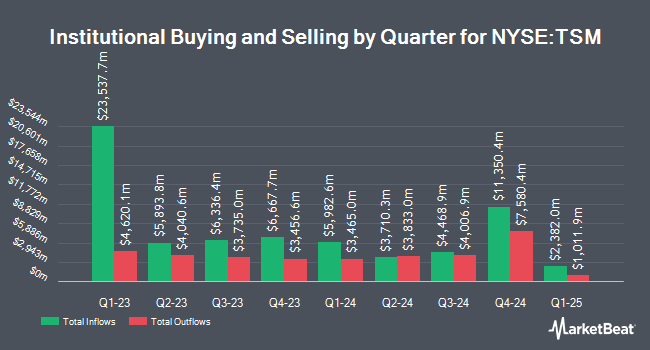Tokio Marine Asset Management Co. Ltd. lifted its holdings in Taiwan Semiconductor Manufacturing Company Ltd. (NYSE:TSM - Free Report) by 4.5% during the 1st quarter, according to its most recent 13F filing with the Securities and Exchange Commission (SEC). The fund owned 99,412 shares of the semiconductor company's stock after purchasing an additional 4,300 shares during the period. Taiwan Semiconductor Manufacturing comprises 0.6% of Tokio Marine Asset Management Co. Ltd.'s holdings, making the stock its 29th biggest holding. Tokio Marine Asset Management Co. Ltd.'s holdings in Taiwan Semiconductor Manufacturing were worth $16,502,000 as of its most recent SEC filing.
Several other hedge funds also recently made changes to their positions in TSM. City Holding Co. grew its stake in shares of Taiwan Semiconductor Manufacturing by 238.0% in the 1st quarter. City Holding Co. now owns 169 shares of the semiconductor company's stock worth $28,000 after purchasing an additional 119 shares during the last quarter. Accredited Wealth Management LLC acquired a new position in shares of Taiwan Semiconductor Manufacturing in the fourth quarter worth about $31,000. Signature Resources Capital Management LLC boosted its holdings in shares of Taiwan Semiconductor Manufacturing by 138.8% in the first quarter. Signature Resources Capital Management LLC now owns 191 shares of the semiconductor company's stock worth $32,000 after buying an additional 111 shares during the period. Graybill Wealth Management LTD. acquired a new position in shares of Taiwan Semiconductor Manufacturing in the first quarter worth about $33,000. Finally, Vision Financial Markets LLC acquired a new position in shares of Taiwan Semiconductor Manufacturing in the first quarter worth about $33,000. Institutional investors and hedge funds own 16.51% of the company's stock.
Taiwan Semiconductor Manufacturing Stock Down 1.1%
Shares of TSM stock traded down $2.78 during trading on Wednesday, hitting $241.51. 7,961,236 shares of the company were exchanged, compared to its average volume of 11,997,785. The company has a debt-to-equity ratio of 0.18, a quick ratio of 2.15 and a current ratio of 2.37. The firm has a market capitalization of $1.25 trillion, a price-to-earnings ratio of 27.54, a P/E/G ratio of 1.18 and a beta of 1.19. The business's 50-day simple moving average is $229.05 and its 200 day simple moving average is $197.31. Taiwan Semiconductor Manufacturing Company Ltd. has a twelve month low of $134.25 and a twelve month high of $248.28.
Taiwan Semiconductor Manufacturing (NYSE:TSM - Get Free Report) last posted its quarterly earnings results on Thursday, July 17th. The semiconductor company reported $2.47 EPS for the quarter, topping the consensus estimate of $2.13 by $0.34. The business had revenue of $30.07 billion during the quarter, compared to analysts' expectations of $28.50 billion. Taiwan Semiconductor Manufacturing had a net margin of 42.91% and a return on equity of 32.87%. The firm's quarterly revenue was up 44.4% compared to the same quarter last year. During the same period last year, the company posted $1.48 earnings per share. As a group, analysts forecast that Taiwan Semiconductor Manufacturing Company Ltd. will post 9.2 EPS for the current fiscal year.
Taiwan Semiconductor Manufacturing Cuts Dividend
The business also recently declared a quarterly dividend, which will be paid on Thursday, October 9th. Investors of record on Tuesday, September 16th will be issued a dividend of $0.6499 per share. This represents a $2.60 annualized dividend and a dividend yield of 1.1%. The ex-dividend date is Tuesday, September 16th. Taiwan Semiconductor Manufacturing's dividend payout ratio (DPR) is currently 28.16%.
Wall Street Analysts Forecast Growth
TSM has been the subject of several recent analyst reports. Needham & Company LLC reiterated a "buy" rating and issued a $270.00 target price on shares of Taiwan Semiconductor Manufacturing in a report on Thursday, July 17th. Susquehanna raised their target price on shares of Taiwan Semiconductor Manufacturing from $255.00 to $265.00 and gave the stock a "positive" rating in a report on Monday, July 14th. Barclays reiterated an "overweight" rating and issued a $240.00 target price (up from $215.00) on shares of Taiwan Semiconductor Manufacturing in a report on Tuesday, June 3rd. Finally, Citigroup reiterated a "buy" rating on shares of Taiwan Semiconductor Manufacturing in a report on Thursday, May 22nd. One equities research analyst has rated the stock with a hold rating and four have given a buy rating to the company's stock. According to data from MarketBeat, the stock currently has a consensus rating of "Moderate Buy" and an average price target of $258.33.
Read Our Latest Stock Report on TSM
Taiwan Semiconductor Manufacturing Company Profile
(
Free Report)
Taiwan Semiconductor Manufacturing Company Limited, together with its subsidiaries, manufactures, packages, tests, and sells integrated circuits and other semiconductor devices in Taiwan, China, Europe, the Middle East, Africa, Japan, the United States, and internationally. It provides a range of wafer fabrication processes, including processes to manufacture complementary metal- oxide-semiconductor (CMOS) logic, mixed-signal, radio frequency, embedded memory, bipolar CMOS mixed-signal, and others.
Read More

Before you consider Taiwan Semiconductor Manufacturing, you'll want to hear this.
MarketBeat keeps track of Wall Street's top-rated and best performing research analysts and the stocks they recommend to their clients on a daily basis. MarketBeat has identified the five stocks that top analysts are quietly whispering to their clients to buy now before the broader market catches on... and Taiwan Semiconductor Manufacturing wasn't on the list.
While Taiwan Semiconductor Manufacturing currently has a Buy rating among analysts, top-rated analysts believe these five stocks are better buys.
View The Five Stocks Here
Discover the 10 Best High-Yield Dividend Stocks for 2025 and secure reliable income in uncertain markets. Download the report now to identify top dividend payers and avoid common yield traps.
Get This Free Report
Like this article? Share it with a colleague.
Link copied to clipboard.